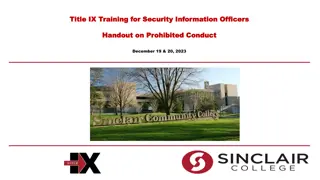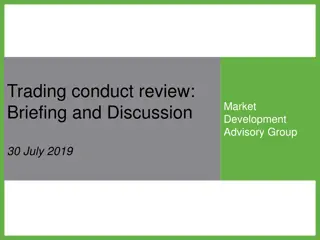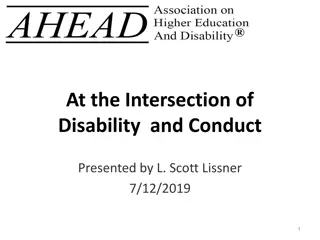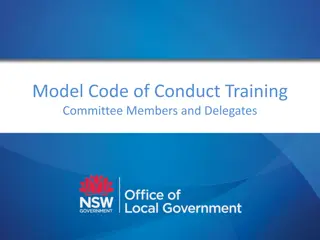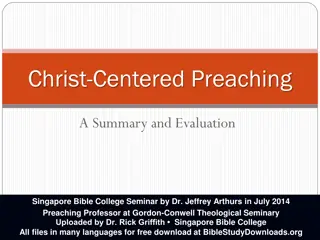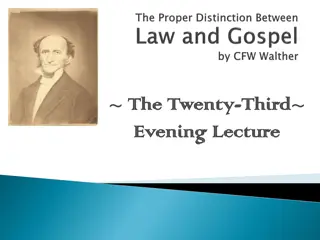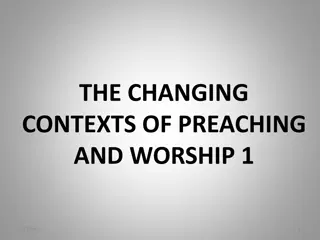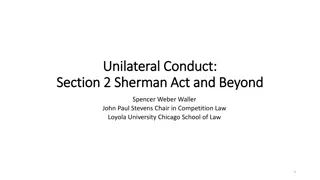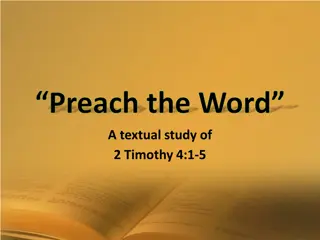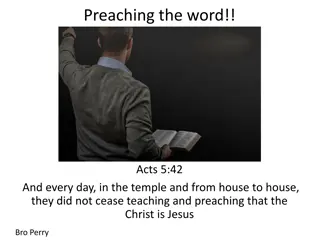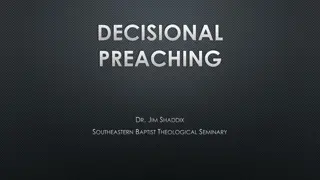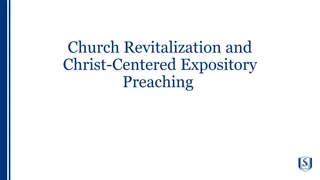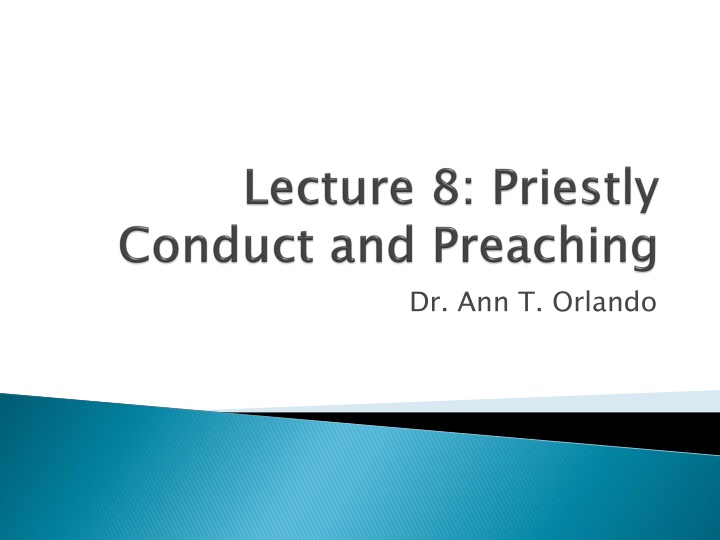
Tensions Between Vita Contemplativa and Vita Activa: Priestly Duties and Moral Conduct
Explore the historical conflicts between the contemplative and active ways of life, focusing on priestly responsibilities, moral conduct, and the roles of presbyters and bishops. Learn about the Stoic understanding of morality in society, as well as the concept of homileo in ancient gatherings. Discover the balance between study, prayer, teaching, preaching, and judgment within ecclesiastical and civil contexts.
Download Presentation

Please find below an Image/Link to download the presentation.
The content on the website is provided AS IS for your information and personal use only. It may not be sold, licensed, or shared on other websites without obtaining consent from the author. If you encounter any issues during the download, it is possible that the publisher has removed the file from their server.
You are allowed to download the files provided on this website for personal or commercial use, subject to the condition that they are used lawfully. All files are the property of their respective owners.
The content on the website is provided AS IS for your information and personal use only. It may not be sold, licensed, or shared on other websites without obtaining consent from the author.
E N D
Presentation Transcript
Tensions between vita contemplativa and vita activa Priestly duty and authority Preaching and rhetoric Pope St Gregory the Great
The contemplative life of study and prayer was (is) considered the superior way of life Understood as removed from vita activa But few are able or called to devote themselves to this way of life The role of vita contemplativa for priests will be addressed in next class NB the aversion to priesthood (or worse the episcopacy) was that it was a call to an active life
Proper conduct (morality) in the vita activa is rooted in Stoic understanding Rank and duty within and to orders in society Authority associated with rank and duty Ultimately, rank and duty in society are governed by Providence Thus the effect of good acts is under reserve They come to fruition only if decreed by Fate See Cicero, De Officiis For no phase of life, whether public or private, whether in business or in the home, whether one is working on what concerns oneself alone or dealing with another, can be without its moral duty; on the discharge of such duties depends all that is morally right, and on their neglect all that is morally wrong in life. I.2.4
Presbyter and Bishop Moral example to the laity Teach catechumens Preach faithful Bishop Ordain Presbyters Judge (ecclesial and civil after Constantine) Offer the Sacrifice I Timothy is very concerned with teaching Who should teach Who should not teach (especially women, I Tm 2) Presbyters are called out as teachers and preacher (I Tm 5:17)
Homileo, Greek, to converse with, to address In antiquity this was often associated with speeches given at symposiums In Jewish practice, associated conversations while studying the Law in synagogue Philo uses the term in both senses in his description of the gathering of the Therapeutae, described in On the Contemplative Life, 75-78 During their festal gathering, a presider selects a passage from Scripture He then expounds on its meaning
Luke uses this word in both the Gospel and the Acts In Lk 24:14, 17 the disciples on the road to Emmaus In Acts 20:11, Paul goes to an upper room; breaks bread; then converses with Christians in Troas During the later 1stand 2ndC Christianity, it comes to mean a presentation by the bishop/presbyter at the Eucharist Focused on explaining Scripture
Greek, kateckeo, to instruct Not found in LXX, and not often used in secular Greek sources In New Testament used to mean to instruct or inform Luke (Gospel and Acts) Paul (Romans, I Corinthians, Galacians) In the early Church, those who were being informed in preparation for Baptism were catechumens Bishops offered them catechetical instructions
Written to a deacon in Carthage who has been tasked with instructing catechumens Deacon has written to Augustine because he feels inadequate Augustine offers suggestions How to present the faith rooted in Scripture How not to become discouraged when teaching
Established a monastery in Rome that followed Benedict s Rule Wrote a life of Benedict; only source of information on Benedict and Scholastica (according to Gregory both smarter and greater in love than her brother) Reformed Roman clergy around monastic model Sent Augustine of Canterbury to England Earliest extant life of Gregory written by a nun in Whitby, 8th C 10
Issues with clergy in West during time of Gregory Great: crass Money and power were in Church Tax and military benefits for clergy Issues with clergy: intellectual Church controlled education Church (monasteries) places of quiet refuge 11
First published as a short work in 593; also translated into Greek Key theme: Pastor must meet his people where they are (condescension) and draw them up toward salvation To do this, the Pastor must be a man of personal wisdom and spirituality Pastor is a doctor of souls Model for entire church is relation between abbot and monks Division of Pastoral Rule Part I Who should (and should not) be pastors Part II How Pastors should lead their lives Part III Teaching and Preaching Part IV Greatest temptation for Pastors: pride 12
Pastors must live the life they preach Distinction between studying and learning something academically and being able to live it Pastor must follow example of Christ in humility; be careful not to be like Saul and David A man endowed with great gifts should not decline becoming a pastor; in so doing he also deprives himself of the advantage of his gifts Man with ability to rule should not be content to hide in monastery 13
Life of pastor set apart from flock Symbolism of priest s vestments Pastor should transfer to himself the infirmities of others even as his contemplation leads him to God Example of Paul s condescending love to those who are married Moses gong in and out of tabernacle Humility of pastors: joy should not be in ruling over men, but in helping them to salvation Pastor must continue to develop his own inner life, even as he is occupied with external affairs Vices can sometimes masquerade as virtues Pastors must study Scripture every day to renew their heart 14
Pastor must distinguish among his listeners must touch the hearts of his hearers by using one and the same doctrine, but not by giving to all one and the same exhortation Series of admonishments; longest part of Rule 15
While restoring others to health, the pastor must not neglect his own health Greatest problem for pastor is pride Pastor must not be secure in his self- confidence The pastor must not be deceived by success when the wealth of virtues flatters us, the eye of the soul should turn its gaze on its infirmities 16
Distinctive Roman liturgical practices started in 5th C with Popes Leo and Gelasius But practices were local depending on bishop Gregory collected and ordered various liturgical prayers and hymns Gregorian Sacramentary Gregorian Antiphonary Gregory s Roman Sacramentary quickly became standard throughout Europe in Roman Catholic Church Gregorian Chant became the standard music of Roman Catholic Church Emphasis on Mass as sacrifice 17
Gregory the Great, Pastoral Rule, Books I III, selections available on BC Course Reserves Augustine, Sermon 354 (SKIP) Instead read handout from Instructing Beginners in the Faith Prepare Paper #8



